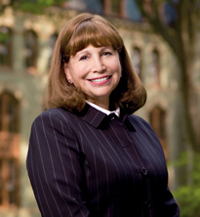Doing What We Do Best
One of the hallmarks of Teachers College is that we are, despite our name, about more than just about teachers. This is more than a curiosity; from its earliest days under the prescient leadership of James Earl Russell, the College has taken the broad view that education neither begins nor ends in the classroom, and that issues of health, psychology, family life, organizational thinking, citizenship and much more are as relevant to developing minds as instruction in the three Rs.
This issue of Inside shows that we still value and maintain that breadth of focus—and that we still are making valuable contributions in all of these areas. Two of the stories here focus on studies conducted by faculty members in our Health and Behavior Studies Department. One, led by Professor Stephen Peverly, highlights important cultural differences in the way Chinese and American math teachers learn and practice their craft, and draws connections to the different kinds of outcomes that each achieves with students. The other, led by Professor Charles Basch, finds that using telephone outreach as a means of prompting people to seek medical screening for colon cancer can be an effective means of boosting screening rates—particularly among people of color, who are at increased risk for developing the disease.
These are solid pieces of research that can help guide policy and practice in different fields and, ultimately, materially improve lives.
Another story in this issue focuses on a very different kind of endeavor: the development, by a group of TC faculty, students, staff and alumni, of a teaching curriculum for use with high school students who view the recent Spike Lee documentary, “When the Levees Broke.” This work will help students explore issues raised by perhaps the most devastating natural disaster in our nation’s history and—more importantly—its deeply disturbing aftermath. At issue are the kinds of questions raised in the past by John Dewey, Maxine Greene and others among our College’s greatest minds: What kind of society are we, and what kind of society do we want to be? What are our core values, and how can we foster them in our children?
Each of these stories is tremendously important. But it is perhaps another—the profile of Dennis Chambers, a longtime TC security guard—that makes me the proudest. Like so many other people here, Mr. Chambers, in addition to his job, is working toward a TC degree—a doctorate in Adult and Organizational Learning. Meanwhile, he is running a school of his own, aimed at teaching young people a range of life skills, from the discipline of martial arts to the skills involved in choosing friends.
Mr. Chambers may be a particularly outstanding example, but he is proof that wherever you look at TC, people are engaged in the world of education, in any number of its many forms. That, to me, is the surest sign of our health as an institution, because people who teach must continue to learn. After all, that’s why they call it “Teachers College.”
Published Monday, Jan. 22, 2007
